- Home
- David Eddings
Belgarath the Sorcerer and Polgara the Sorceress Page 2
Belgarath the Sorcerer and Polgara the Sorceress Read online
Page 2
‘You’re lazy, Belgarath,’ Durnik accused.
‘Are you only just noticing that? I thought you were more observant.’
‘You won’t do it then?’ Garion demanded.
‘Not unless somebody comes up with a better reason than you two have so far.’
The bedroom door opened, and Poledra came out into the kitchen. ‘Are you three going to talk all night?’ she demanded in a quiet voice. ‘If you are, go do it someplace else. If you wake the babies …’ she left it hanging ominously.
‘We were just thinking about going to bed, dear,’ Belgarath lied blandly.
‘Well, do it then. Don’t just sit there and talk about it.’
Belgarath stood up and stretched – perhaps just a bit theatrically. ‘She’s right, you know,’ he said to his two friends. ‘It’ll be daylight before long, and the twins have been resting up all night. If we’re going to get any sleep, we’d better do it now.’
Later, after the three of them had climbed up into the loft and rolled themselves into blankets on the pallets Durnik kept stored up there, Garion lay looking down at the slowly waning firelight and the flickering shadows in the room below. He thought of Ce’Nedra and his own children, of course, but then he let his mind drift back over the events of this most special of nights. Aunt Pol had always been at the very center of his life, and with the birth of her twins, her life was now fulfilled.
Near to sleep, the Rivan King found his thoughts going back over the conversation he had just had with Durnik and his grandfather. He was honest enough with himself to admit that his desire to read Belgarath’s history of the world was not entirely academic. The old sorcerer was a very strange and complex man, and his story promised to provide insights into his character that could come from no other source. He’d have to be pushed, of course. Belgarath was an expert at avoiding work of any kind. Garion, however, thought he knew of a way to pry the story out of his grandfather. He smiled to himself as the fire burned lower and lower in the room below. He knew he could find out how it all began.
And then, because it was really quite late, Garion fell asleep, and, perhaps because of all the familiar things in Aunt Pol’s kitchen down below, he dreamed of Faldor’s farm, where his story had begun.
PART ONE
The Vale
Chapter 1
The problem with any idea is the fact that the more it gets bandied about, the more feasible it seems to become. What starts out as idle speculation – something mildly entertaining to while away a few hours before going to bed – can become, once others are drawn into it, a kind of obligation. Why can’t people understand that just because I’m willing to talk about something, it doesn’t automatically follow that I’m actually willing to do it?
As a case in point, this all started with Durnik’s rather inane remark about wanting to hear the whole story. You know how Durnik is, forever taking things apart to see what makes them work. I can forgive him in this case, however. Pol had just presented him with twins, and new fathers tend to be a bit irrational. Garion, on the other hand, should have had sense enough to leave it alone. I curse the day when I encouraged that boy to be curious about first causes. He can be so tedious about some things. If he’d have just let it drop, I wouldn’t be saddled with this awful chore.
But no. The two of them went on and on about it for day after day as if the fate of the world depended on it. I tried to get around them with a few vague promises – nothing specific, mind you – and fervently hoped that they’d forget about the whole silly business.
Then Garion did something so unscrupulous, so underhanded, that it shocked me to the very core. He told Polgara about the stupid idea, and when he got back to Riva, he told Ce’Nedra. That would have been bad enough, but would you believe that he actually encouraged those two to bring Poledra into it?
I’ll admit right here that it was my own fault. My only excuse is that I was a little tired that night. I’d inadvertently let something slip that I’ve kept buried in my heart for three eons. Poledra had been with child, and I’d gone off and left her to fend for herself. I’ve carried the guilt over that for almost half of my life. It’s like a knife twisting inside me. Garion knew that, and he coldly, deliberately, used it to force me to take on this ridiculous project. He knows that under these circumstances, I simply cannot refuse anything my wife asks of me.
Poledra, of course, didn’t put any pressure on me. She didn’t have to. All she had to do was suggest that she’d rather like to have me go along with the idea. Under the circumstances, I didn’t have any choice. I hope that the Rivan King is happy about what he’s done to me.
This is most certainly a mistake. Wisdom tells me that it would be far better to leave things as they are, with event and cause alike half-buried in the dust of forgotten years. If it were up to me, I’d leave it that way. The truth is going to upset a lot of people.
Few will understand and fewer still accept what I am about to set forth, but as my grandson and son-in-law so pointedly insisted, if I don’t tell the story, somebody else will; and, since I alone know the beginning and middle and end of it, it falls to me to commit to perishable parchment, with ink that begins to fade before it even dries, some ephemeral account of what really happened – and why.
Thus, let me begin this story as all stories are begun, at the beginning.
I was born in the village of Gara, which no longer exists. It lay, if I remember it correctly, on a pleasant green bank beside a small river that sparkled in the summer sun as if its surface were covered with jewels – and I’d trade all the jewels I’ve ever owned or seen to sit again beside that unnamed river.
Our village was not rich, but in those days none were. The world was at peace, and our Gods walked among us and smiled upon us. We had enough to eat and huts to shelter us from the weather. I don’t recall who our God was, nor his attributes, nor his totem. I was very young at the time, and it was, after all, long ago.
I played with the other children in the warm, dusty streets, ran through the long grass and the wildflowers in the meadows, and paddled in that sparkling river which was drowned by the Sea of the East so many years ago that they are beyond counting.
My mother died when I was quite young. I remember that I cried about it for a long time, though I must honestly admit that I can no longer even remember her face. I remember the gentleness of her hands and the warm smell of fresh-baked bread that came from her garments, but I can’t remember her face. Isn’t that odd?
The people of Gara took over my upbringing at that point. I never knew my father, and I have no recollection of having any living relatives in that place. The villagers saw to it that I was fed, gave me cast-off clothing, and let me sleep in their cow-sheds. They called me Garath, which meant ‘of the town of Gara’ in our particular dialect. It may or may not have been my real name. I can no longer remember what name my mother had given me, not that it really matters, I suppose. Garath was a serviceable enough name for an orphan, and I didn’t loom very large in the social structure of the village.
Our village lay somewhere near where the ancestral homelands of the Tolnedrans, the Nyissans and the Marags joined. I think we were all of the same race, but I can’t really be sure. I can only remember one temple – if you can call it that – which would seem to indicate that we all worshiped the same God and were thus of the same race. I was indifferent to religion at that time, so I can’t recall if the temple had been raised to Nedra or Mara or Issa. The lands of the Arends lay somewhat to the north, so it’s even possible that our rickety little church had been built to honor Chaldan. I’m certain that we didn’t worship Torak or Belar. I think I’d have remembered had it been either of those two.
Even as a child I was expected to earn my keep; the villagers weren’t very keen about maintaining me in idle luxury. They put me to work as a cow-herd, but I wasn’t very good at it, if you must know the truth. Our cows were scrubby and quite docile, so not too many of them strayed off while they were
in my care, and those that did usually returned for milking in the evening. All in all, though, being a cow-herd was a good vocation for a boy who wasn’t all that enthusiastic about honest work.
My only possessions in those days were the clothes on my back, but I soon learned how to fill in the gaps. Locks had not yet been invented, so it wasn’t too difficult for me to explore the huts of my neighbors when they were out working in the fields. Mostly I stole food, although a few small objects did find their way into my pockets from time to time. Unfortunately, I was the natural suspect when things turned up missing. Orphans were not held in very high regard at that particular time. At any rate, my reputation deteriorated as the years went by, and the other children were instructed to avoid me. My neighbors viewed me as lazy and generally unreliable, and they also called me a liar and a thief – often right to my face! I won’t bother to deny the charges, but it’s not really very nice to come right out and say it like that, is it? They watched me closely, and they pointedly told me to stay out of town except at night. I largely ignored those petty restrictions and actually began to enjoy the business of creeping about in search of food or whatever else might fall to hand. I began to think of myself as a very clever fellow.
I guess I was about thirteen or so when I began to notice girls. That really made my neighbors nervous. I had a certain rakish celebrity in the village, and young people of an impressionable age find that sort of thing irresistibly attractive. As I said, I began to notice girls, and the girls noticed me right back. One thing led to another, and on a cloudy spring morning one of the village elders caught me in his hay-barn with his youngest daughter. Let me hasten to assure you that nothing was really going on. Oh, a few harmless kisses, perhaps, but nothing any more serious. The girl’s father, however, immediately thought the worst of me and gave me the thrashing of my life.
I finally managed to escape from him and ran out of the village. I waded across the river and climbed the hill on the far side to sulk. The air was cool and dry, and the clouds raced overhead in the fresh young wind. I sat there for a very long time considering my situation. I concluded that I had just about exhausted the possibilities of Gara. My neighbors, with some justification, I’ll admit, looked at me with hard-eyed suspicion most of the time, and the incident in the hay-barn was likely to be blown all out of proportion. A certain cold logic advised me that it wouldn’t be too long before I’d be pointedly asked to leave.
Well, I certainly wasn’t going to give them that satisfaction. I looked down at the tiny cluster of dun-colored huts beside a small river that didn’t sparkle beneath the scudding clouds of spring. And then I turned and looked to the west at a vast grassland and white-topped mountains beyond and clouds roiling titanic in the grey sky, and I felt a sudden overwhelming compulsion to go. There was more to the world than the village of Gara, and I suddenly wanted very much to go look at it. There was nothing really keeping me, and the father of my little playmate would probably be lying in wait for me – with cudgel – every time I turned around. I made up my mind at that point.
I visited the village one last time – shortly after midnight. I certainly didn’t intend to leave empty-handed. A storage shed provided me with as much food as I could conveniently carry, and, since it’s not prudent to travel unarmed, I also took a fairly large knife. I’d fashioned a sling a year or so previously, and the tedious hours spent watching over other people’s cows had given me plenty of time for practice. I wonder whatever happened to that sling.
I looked around the shed and decided that I had everything I really needed, and so I crept quietly down that dusty street, waded across the river again, and went from that place forever.
When I think back on it, I realize that I owe that heavy-handed villager an enormous debt of gratitude. Had he not come into that barn when he did, I might never have climbed that hill on such a day to gaze to the west, and I might very well have lived out my life in Gara and died there. Isn’t it odd how the little things can change a man’s entire life?
The lands of the Tolnedrans lay to the west, and by morning I was well within their borders. I had no real destination in mind, just that odd compulsion to travel westward. I passed a few villages, but saw no real reason to stop.
It was two – or perhaps three – days after I left Gara when I encountered a humorous, good-natured old fellow driving a rickety cart. ‘Where be ye bound, boy?’ he asked me in what seemed to me at the time to be an outlandish dialect.
‘Oh,’ I replied with a vague gesture toward the west, ‘that way, I guess.’
‘You don’t seem very certain.’
I grinned at him. ‘I’m not,’ I admitted. ‘It’s just that I’ve got a powerful urge to see what’s on the other side of the next hill.’
He evidently took me quite literally. At the time I thought he was a Tolnedran, and I’ve noticed that they’re all very literal-minded. ‘Not much on the other side of that hill up ahead but Tol Malin,’ he told me.
‘Tol Malin?’
‘It’s a fair-sized town. The people who live there have a puffed-up opinion of themselves. Anybody else wouldn’t have bothered with that “Tol”, but they seem to think it makes the place sound important. I’m going that way myself, and if you’re of a mind, you can ride along. Hop up, boy. It’s a long way to walk.’
I thought at the time that all Tolnedrans spoke the way he did, but I soon found out that I was wrong. I tarried for a couple of weeks in Tol Malin, and it was there that I first encountered the concept of money. Trust the Tolnedrans to invent money. I found the whole idea fascinating. Here was something small enough to be portable and yet of enormous value. Someone who’s just stolen a chair or a table or a horse is fairly conspicuous. Money, on the other hand, can’t be identified as someone else’s property once it’s in your pocket.
Unfortunately, Tolnedrans are very possessive about their money, and it was in Tol Malin that I first heard someone shout, ‘Stop, thief!’ I left town rather quickly at that point.
I hope you realize that I wouldn’t be making such an issue of some of my boyhood habits except for the fact that my daughter can be very tiresome about my occasional relapses. I’d just like for people to see my side of it for a change. Given my circumstances, did I really have any choice?
Oddly enough, I encountered that same humorous old fellow again about five miles outside Tol Malin. ‘Well, boy,’ he greeted me. ‘I see that you’re still moving along westward.’
‘There was a little misunderstanding back in Tol Malin,’ I replied defensively. ‘I thought it might be best for me to leave.’
He laughed knowingly, and for some reason his laughter made my whole day seem brighter. He was a very ordinary-looking old fellow with white hair and beard, but his deep blue eyes seemed strangely out of place in his wrinkled face. They were very wise, but they didn’t seem to be the eyes of an old man. They also seemed to see right through all my excuses and lame explanations. ‘Well, hop up again, boy,’ he told me. ‘We still both seem to be going in the same direction.’
We traveled across the lands of the Tolnedrans for the next several weeks, moving steadily westward. This was before those people developed their obsession with straight, well-maintained roads, and what we followed were little more than wagon tracks that meandered along the course of least resistance across the meadows.
Like just about everybody else in the world in those days, the Tolnedrans were farmers. There were very few isolated farmsteads out in the countryside, because for the most part the people lived in villages, went out to work their fields each morning, and returned to the villages each night.
We passed one of those villages one morning about the middle of summer, and I saw those farmers trudging out to work. ‘Wouldn’t it be easier if they’d just build their houses out where their fields are?’ I asked the old man.
‘Probably so,’ he agreed, ‘but then they’d be peasants instead of townsmen. A Tolnedran would sooner die than have others think of him as a pea
sant.’
‘That’s ridiculous,’ I objected. ‘They spend all day every day grubbing in the dirt, and that means that they are peasants, doesn’t it?’
‘Yes,’ he replied calmly, ‘but they seem to think that if they live in a village, that makes them townsmen.’
‘Is that so important to them?’
‘Very important, boy. A Tolnedran always wants to keep a good opinion of himself.’
‘I think it’s stupid, myself.’
‘Many of the things people do are stupid. Keep your eyes and ears open the next time we go through one of these villages. If you pay attention, you’ll see what I’m talking about.’
I probably wouldn’t even have noticed if he hadn’t pointed it out. We passed through several of those villages during the next couple of weeks, and I got to know the Tolnedrans. I didn’t care too much for them, but I got to know them. A Tolnedran spends just about every waking minute trying to determine his exact rank in his community, and the higher he perceives his rank to be, the more offensive he becomes. He treats his servant badly – not out of cruelty, but out of a deep-seated need to establish his superiority. He’ll spend hours in front of a mirror practicing a haughty, superior expression. Maybe that’s what set my teeth on edge. I don’t like having people look down their noses at me, and my status as a vagabond put me at the very bottom of the social ladder, so everybody looked down his nose at me.
‘The next pompous ass who sneers at me is going to get a punch in the mouth,’ I muttered darkly as we left one village as summer was winding down.
The old man shrugged. ‘Why bother?’
‘I don’t care for people who treat me like dirt.’
‘Do you really care what they think?’
‘Not in the slightest.’
‘Why waste your energy then? You’ve got to learn to laugh these things off, boy. Those self-important villagers are silly, aren’t they?’

 The Losers
The Losers The Ruby Knight
The Ruby Knight The Sapphire Rose
The Sapphire Rose King of the Murgos
King of the Murgos The Seeress of Kell
The Seeress of Kell Demon Lord of Karanda
Demon Lord of Karanda Pawn of Prophecy
Pawn of Prophecy Queen of Sorcery
Queen of Sorcery Castle of Wizardry
Castle of Wizardry Guardians of the West
Guardians of the West Sorceress of Darshiva
Sorceress of Darshiva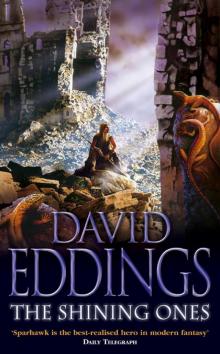 The Shining Ones
The Shining Ones Enchanters' End Game
Enchanters' End Game Magician's Gambit
Magician's Gambit High Hunt
High Hunt The Hidden City
The Hidden City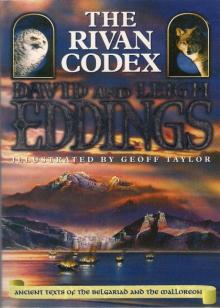 The Rivan Codex
The Rivan Codex Regina's Song
Regina's Song The Elder Gods
The Elder Gods The Malloreon: Book 02 - King of the Murgos
The Malloreon: Book 02 - King of the Murgos The Malloreon: Book 05 - Seeress of Kell
The Malloreon: Book 05 - Seeress of Kell Treasured One
Treasured One The Malloreon: Book 04 - Sorceress of Darshiva
The Malloreon: Book 04 - Sorceress of Darshiva The Malloreon: Book 03 - Demon Lord Of Karanda
The Malloreon: Book 03 - Demon Lord Of Karanda Belgarath the Sorcerer and Polgara the Sorceress
Belgarath the Sorcerer and Polgara the Sorceress The Malloreon: Book 01 - Guardians of the West
The Malloreon: Book 01 - Guardians of the West The Treasured One
The Treasured One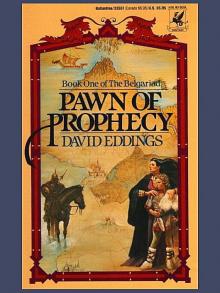 Pawn of Prophecy tb-1
Pawn of Prophecy tb-1 Polgara the Sorceress
Polgara the Sorceress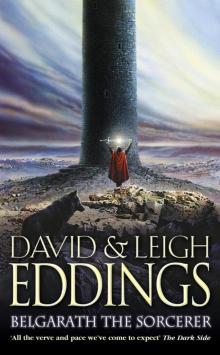 Belgarath the Sorcerer
Belgarath the Sorcerer The Younger Gods
The Younger Gods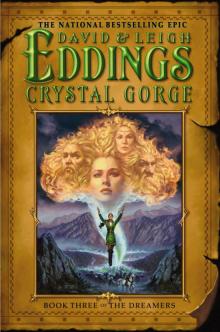 Crystal Gorge
Crystal Gorge